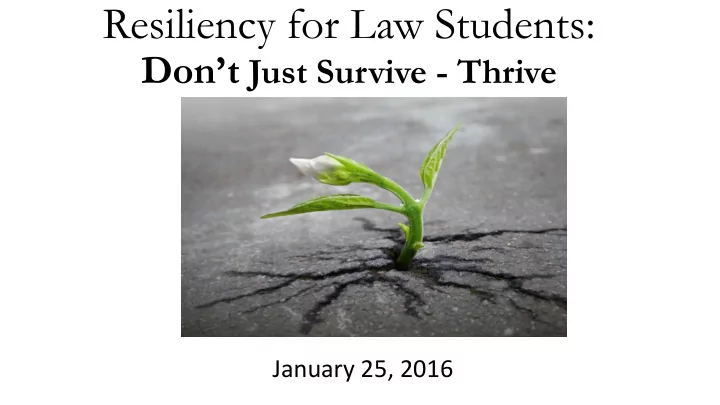

Resiliency for Law Students: Don’t Just Survive - Thrive January 25, 2016
Let’s start with finding our baseline A first year law student is very interested in criminal law. In fact, that is why he came to law school. January has rolled around and he received a grade of “C” on his Criminal Law exam. He emailed his professor to talk about the exam but he has not received a reply from the professor. • First Reactions?
How about… • Your Constitutional Law professor has singled you out before class begins and asks you to see her after class. • First Reactions?
Why do we do this?
Channeling our Inner Cave Man
Consequences of Stress Hormone “ Overdose ” • Cardiovascular disease • Hypertension • Impaired immune function • Decreased cell-mediated immune response • (Increased humoral immune response) • Impaired neurogenesis • Impaired memory
Consequences of Stress Hormone “ Overdose ” • Loss of bone mineral density • Loss of muscle protein • Impaired metabolism • Insulin resistance (type II diabetes) • Increased appetite • Weight gain: Esp. around abdomen • Impaired wound healing
Managing Stress for Success • Physical Activity • Sleep • Nutrition • Social Support • Spirituality • Resiliency Skill Development
Large body of study on Resilience Training ( Positive Psychology or Cognitive Behavioral Therapy ) over 30 years • US Military : Army’s Ready and Resilient Programs • Seattle Seahawks : “Confidence comes from what we tell ourselves” • Law Firms: realizing that is affects the bottom line • College and K-12 students: less depression
Our Goal: Develop the positive. But how? Reflexive Reflective Reflexive Often negative Intentional/ Conscious Frequently positive (intentional until instinctual)
Thinking Traps Thinking Traps Ticker Tape 1. Overgeneralizing I am not going to be a good lawyer 2. Catastrophizing Law school was a mistake 3. Emotional Reasoning I feel like a failure 4. Personalization Professor must think I am an idiot 5. Magnification Making a mountain out of a molehill
Escape the Thinking Traps: Our “C” in Criminal Law 1. Time limited view of the problem One instant/happened now 2. Depersonalize the problem The test was hard 3. Inquisitive Mindset What went wrong? 4. Growth mindset What can I do to do better? 5. Keep perspective Many worse things could have happened
Interrupt the Cycle Rewrite Notice the ticker Identify the Attune Yourself the Ticker tape Thinking Traps to adversity Tape Experience the What I wish I Recognize the Failure and would have reflexive reaction negative thoughts thought
Other ways to practice • Mindfulness - Being aware of what is happening around you and inside you • Gratitude Journaling - Train the brain to find the positive and make it easier to see the opportunities • Gratitude Practice – Noticing the kindness of all that surrounds us
To learn more on Resiliency: • http://resiliencycenter.com/ • http://www.cbtandfeelinggood.com/ / • https://www.resiliency.com/what-is-resiliency • http://www.army.mil/readyandresilient/ • http://www.tracomcorp.com/blog/seahawks-victory-shines-light-on- how-mindfulness-training-leads-to-resiliency/ • http://www.lawyerbrainblog.com/2012/09/resilience-and-lawyer- negativity/
Resilience will not make your problems go away, but it can give you the ability to see past them.
Recommend
More recommend